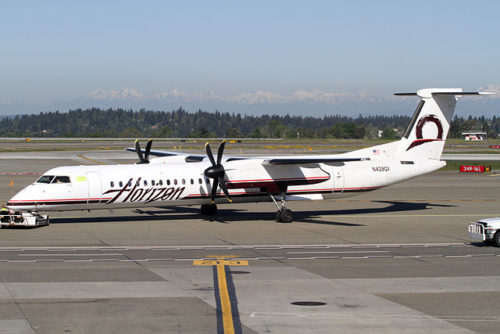SUBSCRIBE TO THE FREE NEWSLETTER
Spokane is on the rise…
This week, Cascadia Daily is reporting from Spokane, Washington… a city where there’s a lot of new creative energy bubbling up. And the secret is out… over the weekend the LA Times did a feature on Spokane’s recent growth. The city now has a metro population of over 700,000 if you include nearby communities across the border in Idaho, and job creation is on the rise, with a host of companies hiring and Amazon building a fulfillment center that will add 1,500 jobs. Housing prices are taking a jump as a result–but it’s still much cheaper than the Puget Sound region. One fascinating fact in the article: more than 2,000 people a year are moving from King County (where Seattle is located) to Spokane County.
There are a ton of things to do here, from arts events to new brewpubs and restaurants. We’ll have more on Spokane’s writing & artist scene tomorrow. It’s a great city, although sometime locals are a little reluctant to admit it. As author and journalist Shawn Vestal put it in the LA Times piece: “”There’s no reason to go around insisting that something doesn’t suck when it truly doesn’t suck.”
Cascadia Magazine original:
Elegy for Tahlequah’s Calf
The Seattle Times reported that Tahlequah, the orca mother holding her stillborn calf afloat in the waters of the Salish Sea, finally let go of her child after a 17-day vigil. If you haven’t yet read Paul E. Nelson’s poem about the orca and the human impacts that have led to the whales’ precarious decline, head over to Cascadia Magazine and read it. It’s a powerful statement of sorrow and grief in the face of climate change.
For more on the next steps to save endangered orcas, read Lynda Mapes’ feature in the Seattle Times.
To find out more about what you can do to help orcas in the Salish Sea, visit Save Our Wild Salmon. Or you can support the efforts of the organization Soundwatch to promote orca whale habitat recovery by “adopting” an orca.
Hijack of Horizon Air plane raises security questions
After an incident this weekend in which a ground crew employee hijacked an empty Horizon Air turboprop plane from Seattle’s SeaTac airport and flew it for over an hour before crashing on a remote island, airport officials across North America are asking why it was so easy to steal a plane.
Removal of prime minister’s statue in Victoria stirs controversy
CBC reports that the city of Victoria has decided to take down a statue of John A. Macdonald, Canada’s first prime minister, in front city hall. The move came in response to Macdonald’s role in creating the Indian Act, which sent Indigenous children to residential schools designed to strip them of their heritage. The move is opposed by those wanting to acknowledge the Victoria-based MP’s role in the founding of Canada.
New approaches to foster care in WA
Investigate West looks into an overlooked segment of Washington’s foster-care system: “kin-caregivers” or extended family who care for children when parents are unable or unfit. More than 40,000 children are in this category, but economic assistance is difficult to qualify for.
Photo essay: getting arrested protesting BC pipeline
The Tyee has a photo essay of First Nations and other protesters being arrested in civil disobedience against the proposed expansion of the Trans Mountain pipeline across British Columbia. Meanwhile, a group of protesters behind Camp Cloud in Burnaby has published an open letter the Burnaby’s mayor asserting that efforts to close the protest site violate Coast Salish law. And Ricochet Media reports on how Canadian federal surveillance has targeted Indigenous activists.
How Cascadia’s cities are greening their streets
Over at Sightline Institute, David Goldberg has a detailed series of articles on how the major cities of Cascadia are greening their streets in an effort to improve safety, promote alternatives to car travel, and help reduce pollution runoff. Read about Vancouver here, about Portland in this piece, and Seattle’s efforts here.
An interview with BC author Esi Edugyan
Victoria-based author Esi Edugyan, who garnered a lot of critical attention for her novel Half-Blood Blues, has a new novel out, Washington Black — the story of an 11-year-old slave on a Caribbean island whose master is obsessed with creating a flying machine. The Guardian has a conversation with Edugyan and US novelist Attica Locke about historical fiction and slavery. The Times Colonist reports on how Edugyan’s book is on the long list for the Booker Prize.
WA Book Award nominees announced
The Seattle Times reports on the finalists announced for the Washington State Book Awards, including fiction by Nancy Pearl, nonfiction by Lyanda Lynn Haupt, and poetry by Claudia Castro Luna.
“Lakes,” fiction by Spokane’s Simeon Mills
The Spokesman-Review is doing a very cool thing and running a new work of fiction each week by a local writer. This week, it’s “Lakes,” by Spokane writer and cartoonist Simeon Mills — a story of nearly-human robots and their odd “family” dynamics: “Robots didn’t get so attached to their parents, like they do now. Your parents disappearing was just part of growing up, a rite of passage, not necessarily a bad thing.” Read the full story here.
That’s today’s round-up of news & arts, posted from lovely (if slightly smoky) city of Spokane, whose name — contrary to that one line in a Ray LaMontagne song — does not rhyme with cocaine. –Andrew Engelson
Photo credit: Horizon Air turboprop plane by Kentaro Iemoto CC BY-SA 2.0

